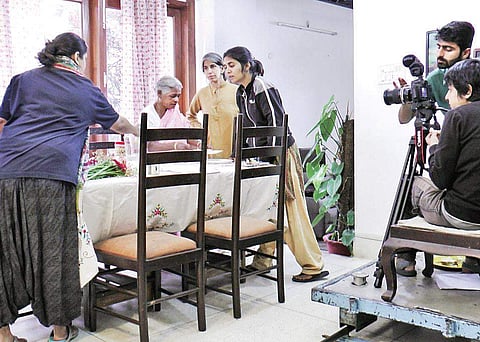

CHENNAI : Roadside chess is called by many names in various parts of the country. For the people of Bhopal a game of Chakki Chauraha, is played with passion. There are friendly and unfriendly matches; and for some the pawns take on moral undertones, causing inevitable tensions during a tournament. Inspired by this, Turup, is a film made by the Bhopal-based Ektara Collective, in which characters play chess as an expression of their different personalities. As the film is set to be screened in the city on April 7, members of the collective tell us more about the film.
Turup was made over a period of two years, and completed in 2017. And since most of them were writers, street theatre artists, singers, and filmmakers, it was only natural for them to work as a collective. Shivani Taneja, who was on production, shares, “We first find a story that we want to tell, and then go back-and-forth with feedback. And because we are writing about a contexts we are all familiar with, we worked well together.”
The script for the film was carefully written with the game of chess playing out as a metaphor throughout. Against this backdrop, a domestic worker with a secret hobby, a former journalist struggling with marriage, and a young woman in love, find themselves pushing the rules of the game. “These protagonists are never seen as the key players on the board. But they do something that challenges the norm, and raises a question — be it of gender, class, caste or dominant religion,” explains Shivani.
Puloma Pal, editor of Turup, explains that the narrative unfolds in many stages, and things that seemed to fall out of place, or appeared very wrong, saved the day. “And we all had our favourite parts, characters and dialogues, which fell in sync and finally acted as the glue to the narrative,” she adds.The lives of the protagonists build parallel to conversations that happen around the chess board — by both the players and onlookers. And the jargons and language of chess, becomes the language of the story too. Shivani shares an example of a dialogue that is self-evident and adds meaning to the frame — Rani par to bahut nazar rehti hai tumhari (You keep a keen eye on the queen).
The members say that while from the outside, it seemed like too much was packed into the script, it’s what the story demanded. And each time the film is screened, the audience’s feedback is vital to them. And how do they think film lovers in Chennai will respond to Turup? Puloma says, “Despite a difference in language, we are tied by experiences that bring us on the same page. So the audience might find their differences, yet agree to whistle at some points in the film.”